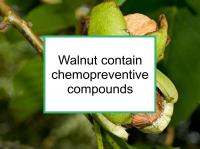While all nuts have benefits, walnuts have the most advantages for breast cancer patients and survivors. Walnuts have the highest total phenolic content, flavonoid content, and antioxidant activity of all common nuts. In addition, walnuts are an excellent source of the omega-3 fatty acid alpha-linolenic acid.
Walnuts contain micronutrients that have been shown to be associated with reduced breast cancer risk, including melatonin and ellagic acid.
Walnut consumption has been shown in several studies to significantly reduce breast tumor incidence and size in laboratory mice. For example, one study reported that a diet including walnuts reduced the tumor size produced by triple negative (ER-/PR-/HER2-) breast cancer cells injected into mice. Now a new study has determined the specific mechanism of action of walnuts against breast cancer cells.
Latest research reports how walnuts act against breast cancer
The study referenced at the beginning of this news story was designed to investigate the mechanism of action by which walnuts inhibit breast cancer growth. The authors tested a walnut extract on MDA-MB-231 triple negative breast cancer cells, MCF-7 hormone receptor positive (ER+/PR+) breast cancer cells, and HeLa cells (a cell line derived from cervical cancer). The extract was found to be toxic to all three cancer cell types.
Next, the authors identified the compounds in the walnut extract that produced this effect. The main compounds were found to be the ellagitannins Tellimagrandin I and Tellimagrandin II. Ellagitannins are a type of polyphenol tannin. Finally, the authors investigated the specific effects of the walnut extract on the cancer cells. Walnut extract was shown to reduce cellular pH and depolarize the mitochondrial membrane. In addition, walnut extract produced a twofold reduction of mitochondria respiration.
Mitochondria are the cell’s “power plants” and are required for normal cell functioning. Recent research suggests that cancer cells also rely on newly generated mitochondria for the additional energy required to migrate through tumor and normal breast tissue, travel in blood vessels, and penetrate new organs.
The authors conclude that programmed cell death and impairment of mitochondrial function underlie the anticancer effects of walnut extract.
